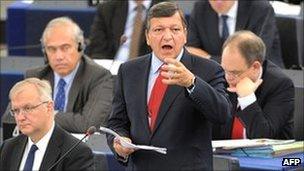Fear in Europe as eurozone crisis deepens
- Published
- comments

For European Commission President Jose Manuel Barroso the vision of a united Europe is at stake
Fear is coursing through the corridors of Brussels. It has been there for some time, usually unspoken or understated. It is now in the open. It is the fear of losing control of events. It is the realisation that most ideas have been tried and still the eurozone crisis deepens.
In the absence of a plan, officials have turned to shock treatment. This was the moment to frighten.
First up, European Commission President Jose Manuel Barroso, for whom this is now an existential crisis. "We are confronted with the most serious challenge of a generation," he told the European Parliament in Strasbourg. "This is a fight for the jobs and prosperity of families in all our member states. This is a fight for the economic and political future of Europe. This is a fight for what Europe represents in the world. This is a fight for European integration itself."
In his final words the warning was clear; the whole vision for a united Europe is at stake.
Next up, Polish Finance Minister Jacek Rostowski. He warned that crisis could destroy the European Union. "Europe is in danger," he told the parliament. "If the eurozone breaks up, the EU will not be able to survive."
For German Chancellor Angela Merkel, too, there is no Europe without the euro. These statements come without any explanation as to why the EU would fold without the single currency.
No relief
For more than 40 years Europe's political class has signed up to the narrative of "ever-closer union". Certainly in Brussels it has been the dream that has guided all the treaties and the institutions; that Europe was moving inexorably towards greater integration. There may be crises, bumps in the road, but its destiny was clear.
For this generation, uncertainty now hangs over their project. They can no longer be certain of their kind of Europe. They no longer own the vision.
For 18 months, Europe's leaders have thrown everything they can at solving the eurozone crisis. Summits have come and gone. Finance ministers have argued late into numerous nights. Sarkozy and Merkel have met frequently.
To date it has been in vain. Greece's debt-to-GDP ratio has only increased. Its debt mountain has climbed. Its economy is in free-fall - contracting this year by anywhere between 5 and 7%. The wages of civil servants have been cut by a fifth. The country's budget deficit remains stubbornly high. Construction in the first part of this year is down almost 50%.
The EU has approved a second bail-out, but still there is no relief. The country seems caught in a cycle of decline. That is why in Germany an orderly Greek default has arrived on the agenda. Most economists I speak to say that default is inescapable.
European officials are desperately trying to close that door.
Crisis of legitimacy
This was the EU's Economic Affairs Commissioner Olli Rehn today: "Let me say a word to those insisting Greece would be better off outside the euro. I very strongly disagree: neither Greece nor the eurozone would be better off. Whichever way you look at it, it is absolutely certain that a default and/or an exit of Greece from the eurozone would carry dramatic economic and social and political costs - not only for Greece but also for all other euro-area member states and EU member states, as well as for our global partners."
President Sarkozy told his cabinet France would do everything in its power to save Greece. Angela Merkel echoes that. But the core of the eurozone problem is this: High debts. No growth and a fragile banking system. The problem is that public opinion - particularly in Germany - has hardened against further aid for Greece or elsewhere. The Greeks too are stubbornly resisting the years of austerity that lie ahead.
Mr Barroso said the answer was more integration, more Europe. That is the dangerous fork in the road. The officials believe that the only answer lies in economic union but they have not brought the people with them. It is a debt crisis but a crisis, too, of legitimacy.
What the Germans are being told is that the future of the EU is on the line - and that might give Chancellor Merkel some room for manoeuvre. But events have their own momentum.